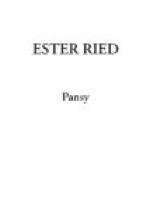AT LAST.
The busy, exciting, triumphant day was done. Sadie Ried was no longer a school-girl; she had graduated. And although a dress of the softest, purest white had been substituted for the blue silk, in which she had so long ago planned to appear, its simple folds had swept the platform of Music Hall in as triumphant a way as ever she had planned for the other. More so, for Sadie’s wildest flights of fancy had never made her valedictorian of her class, yet that she certainly was. In some respects it had been a merry day—the long sealed letters had been opened and read by their respective holders that morning, and the young ladies had discovered, amid much laughter and many blushes, that they were ready to pronounce many of the expressions which they had carefully made only two years before, “ridiculously out of place” or “absurdly sentimental.”
“Progress,” said Mr. Hammond, turning for a moment to Sadie, after he had watched with an amused smile the varying play of expression on her speaking face, while she listened to the reading of her letter.
“You were not aware that you had improved so much in two years, now, were you?”
“I was not aware that I ever was such a simpleton!” was her half-provoked, half-amused reply.
To-night she loitered strangely in the parlors, in the halls, on the stairs, talking aimlessly with any one who would stop; it was growing late. Mrs. Ried and the children had long ago departed. Dr. Van Anden had not yet returned from his evening round of calls. Every body in and about the house was quiet, ere Sadie, with slow, reluctant steps, finally ascended the stairs and sought her room. Arrived there, she seemed in no haste to light the gas; moonlight was streaming into the room, and she put herself down in front of one of the low windows to enjoy it. But it gave her a view of the not far distant cemetery, and gleamed on a marble slab, the lettering of which she knew perfectly well was—“Ester, daughter of Alfred and Laura Ried, died Sept. 4, 18—, aged 19. Asleep in Jesus—Awake to everlasting life.” And that reminded her, as she had no need to be reminded, of a letter with the seal unbroken, lying in her writing-desk—a letter which she had promised to read this evening—promised the one who wrote it for her, and over whose grave the moonlight was now wrapping its silver robe. Sadie felt strangely averse to reading that letter; in part, she could imagine its contents, and for the very reason that she was still “halting between two opinions,” “almost persuaded,” and still on that often fatal “almost” side, instead of the “altogether,” did she wait and linger, and fritter away the evening as best she could, rather than face that solemn letter. Even when she turned resolutely from the window, and lighted the gas, and drew down the shade, she waited to put every thing tidy on her writing-table, and then, when she had finally turned the key in her writing-desk, to read over half a dozen old letters and bits of essays, and scraps of poetry, ere she reached down for that little white envelope, with her name traced by the dear familiar hand that wrote her name no more. At last the seal was broken, and Sadie read:




